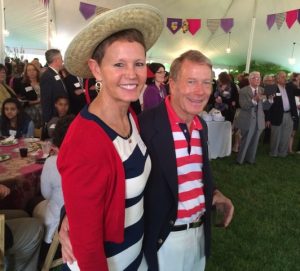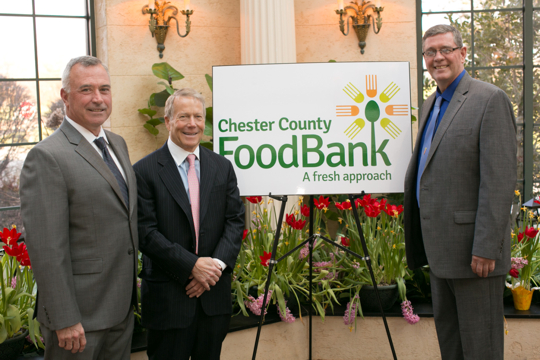For decades, the scion of the founders of Tylenol has put his own spin on the concept of pain relief.

Robert D. McNeil, the founding board chairman of the Chester County Food Bank who stepped off the board earlier this month, has specialized in ministering to other’s distress – a mission that often occurred well below the radar.
“There is no ego in Bob McNeil,” said Ted Beringer, a business associate for about 13 years. “What he has done for the community is immeasurable.”
McNeil, 66, of Highland Township, a successful real-estate magnate who runs Penguin Industries Inc. – nine operating companies and a real estate division – is probably best-known as the face of the Chester County Food Bank, but his philanthropic roots began decades ago. He has played key roles in the Boy Scouts as well as numerous nonprofits, including Community Volunteers in Medicine in West Goshen Township, La Comunidad Hispana in Kennett Square, Bridge of Hope in Exton, and Handi-Crafters Inc. in Thorndale.
Although McNeil has steadfastly eschewed publicity, he agreed to sit down for an interview recently at the urging of friends and associates. They fervently hope that McNeil’s philosophy of social responsibility and his business approach to nonprofits will inspire others.
“Bob is a perfect example of the ‘head and heart’ of philanthropy,” said Noel Stanek, a former Food Bank board member. “Using his business acumen, Bob uses his ‘head’ to assure that the Food Bank – and any other organization that is fortunate enough to have his participation – has good leadership, is financially sound, has insightful planning, achieves expected outcomes and is able to sustain its mission long into the future. But, it is his ‘heart’ that moves him to give generously and work tirelessly to help those in need.”
Beringer agreed, suggesting that many nonprofits would benefit from using McNeil’s methodology, which combines a skill for raising funds with the ability for utilizing them in the most effective manner.

“Bob is a very solid, hard-working, effective business leader,” Beringer said. “What he does for charities in terms of building a great team and then providing them with exceptional leadership is extraordinary.”
McNeil, who grew up on a farm in Plymouth Meeting, was the youngest of four children. And although he probably could have lived comfortably on the family fortune derived from McNeil Laboratories and the creation of Tylenol, he wanted to forge his own path.
He attended the University of the South in Tennessee, where he majored in history because the school had no business curriculum. He said he got a decent education but wasn’t fully engaged as a student. Following graduation – and still uncertain of a career path – McNeil entered the Wharton Business School at the University of Pennsylvania, which had an entrepreneurial center – and coursework that McNeil found fascinating.
In fact, that educational experience made him so eager to try his hand at business that he left midway through the program. He said his first start-up attempt proved more instructive than lucrative, but eventually he realized that he had a knack for recognizing the potential of small, struggling companies.
He also moved to Chester County in search of the open space Montgomery County had lost. He bought a 150-acre property, which he placed under easement so that it could never be developed.
McNeil proceeded to purchase a succession of companies in need of first aid, nurturing them until they became attractive acquisitions for larger businesses.
“With smaller companies, you can be involved in all aspects of the decision-making,” he explained.

In the process of immersing himself in the various companies’ day-to-day operations, he amassed knowledge and insight that would facilitate the next purchase – and inform his community service. And while still in his 20s, he received an unexpected contact from the United Cerebral Palsy Association.
“They wanted me to be on their board,” McNeil said. “I told them, ‘I think you want my uncle,’ but they insisted they knew who they were calling and wanted to get some young people involved.”
McNeil said he met with a cerebral palsy victim, an encounter he described as awkward initially; however, by their third meeting, “all of the sudden I had a new friend … the guy just melted my heart.”
Asked about his philanthropic bent, McNeil said it likely occurred by osmosis. “My parents never discussed it,” he said. “They just did it, and I watched them in action.”
McNeil also got inspiration from his older sister Barbara “Barrie” McNeil Jordan, the founding chairman of the board of the Chester County Fund for Women and Girls. She has also served on the boards of the Claneil Foundation, a McNeil family nonprofit that works to create healthy communities by supporting organizations that make a difference in the lives of individuals and families; the Chester County Historical Society; and Winterthur Museum, Garden and Library. Her late husband, Henry Jordan, was a renowned Chester County preservation activist as well as a philanthropist.
Like his sister, McNeil has also been involved with the Claneil Foundation. Mailee Walker, its executive director, said McNeil regularly demonstrates a talent for listening that enables him to pinpoint problems and issues, both known and unknown. “No job is too small or too big for him to tackle, and he always does so with a clever sense of humor and wit,” said Walker.
Pat Gray, who served on the board for eight years, noted that McNeil’s contributions are significant because he gracefully rolls up his sleeves and drills down on an issue. “He should be a role model,” she said. “A lot of philanthropists give money and that’s great, but they don’t realize that there are other roles they can play. Bob knows what it takes to succeed and makes it happen.”

Those associated with the Chester County Food Bank insist that McNeil perfected that philosophy in March 2009 when the CARES Food Network, the former distribution clearinghouse for 27 food cupboards and 38 meal sites in the county, faced bankruptcy.
Ruthie Kranz-Carl, who headed the Chester County Department of Human Services at the time, said when McNeil accepted the county commissioners' request to chair the board of the "to be established" countywide food bank, she thought he would agree to chair meetings and donate to the cause.
“I was surprised that he wanted to get into the depth and details of establishing the organization – and that he felt so passionate about feeding the hungry and nutrition,” Kranz-Carl said. “He did not want to be ‘just a philanthropist,’ and he has certainly achieved that goal.”
McNeil, who has always delved into one nonprofit at a time to maximize the time he can devote to it, said he knew early on that he had found a kindred spirit in Larry Welsch, the Food Bank’s executive director. McNeil said he had an early-morning epiphany about the food bank's mission. He and Welsch disagree about how early it was when McNeil fired off a pre-dawn email stressing that the Food Bank needed to attack the causes of hunger, not just alleviate it. But they concur that Welsch responded quickly – and endorsed the idea.
During the next seven years, the Chester County Food Bank became an independent nonprofit, bought a 9,600-square-foot warehouse, added commercial equipment such as flash-freezers and dehydrators to extend the growing season, expanded a renowned gleaning program that relies on volunteers to pick produce, created educational programming, relocated to a 36,000-square-foot facility and engendered incalculable respect and gratitude.
“His philanthropy and fundraising expertise moved us from a small $75,000-a-year organization to the now $2 million-plus healthy food supplier, supporting a countywide network of pantries and organizations,” said Kranz-Carl, who remains on the board. “I remember when I asked him to scale down the $75,000 budget because I didn't think we could raise that much. He laughed and never let me forget it!”

Stanek explained that McNeil, who exudes “an enduring spirit of philanthropy,” views problems such as hunger, poor health, and poverty, not as isolated issues, but as part of interconnected set of problems that need to be addressed in an integrated manner.
“He recognized that the distribution of food, while critical, was only the start to address this problem,” Stanek said. “That is why his vision for the Food Bank went far beyond the traditional role of food collection and distribution, and included a focus on fresh, healthy food; school-based nutrition education; farm and growing programs; and other activities designed to foster better food choices and long-term behavioral change.”
The process of achieving some of those goals required a buy-in from some of Chester County’s corporate giants, including Endo, QVC, Wegmans, and Vanguard. McNeil said the fact that the companies wanted their employees to do community service dovetailed with the Food Bank’s mission.
“They each put in 20 or more raised beds [to raise fresh produce for the needy],” McNeil said. “We brought community service to them.”
McNeil said one factor that motivated his decision to leave the board stemmed from a strategic plan for the Food Bank, which was in its final stages and established a blueprint for the agency’s future.
“It was time to pass the baton and have other people step up and accept responsibility,” McNeil said. “I’m leaving it in a really good place. We have zero debt, and a strong board and great staff.”
McNeil acknowledged that another reason involved his health. In addition to heart disease, he has been battling cancer. Known for being fiercely private, he said he disclosed that information because he wants people to know that life can go on despite a medical challenge.
“You can make other people gloomy or keep a positive attitude and show people you can fight and still laugh, smile and be normal,” he said.

And even though he plans to spend some time focusing on medical issues, he’s already looking for another nonprofit to assist – and proudly enjoying the fact that both of his two grown children are now serving on nonprofit boards. His wife, Jennifer C. McNeil, is an active member of the board of the Coatesville Youth Initiative.
McNeil said the knowledge that he has helped others is a sufficient reward for his service; however, he periodically received a bonus. “When you visit some of the food cupboards and agencies to check in, they treat you like a king,” he said.
Stanek would find that response well-deserved. “He and his wife Jennifer have been, and continue to be, a mainstay in the not-for-profit community, generously sharing their time, talent and resources to make our region a better place to live, grow and raise a family,” Stanek noted.
She said McNeil utilizes a sharp wit laced with humor to hold himself and others to the highest of standards, never asking anyone to do what he would not do himself. “When he devotes himself to a cause, he gives his all and expects others to do the same,” Stanek said.
Kranz-Carl concurred. “Bob expects a lot of himself and he expects the same dedication and knowledge and responsiveness from all those he works with,” she said. “And he takes no prisoners. Many people have been on the receiving end of a scathing Bob McNeil response if they are not up to snuff. Bob expects things to get moving fast, and often this was faster than others' expectations.”
And McNeil said he has no intention of slowing down. After a seven-year immersion in the Food Bank, he said his exit has proven less difficult than he had feared. However, he will still meet once a month with Welsch and Kranz-Carl. He said that they’ve become friends and that he simply serves as a sounding board.
“In order for my departure to be successful, it had to be 100 percent,” he said. So he had to restrain himself recently when he got some early-morning ideas and automatically put them into one of his characteristic emails.
Then what happened?
“We did not hit the send button,” he said with a smile.


 (5 votes, average: 4.80 out of 5)
(5 votes, average: 4.80 out of 5)
Comments